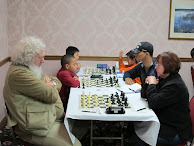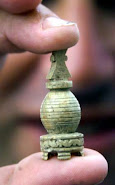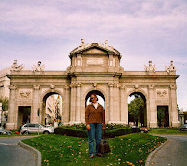Sunday, October 7, 2007
Not For The Faint of Heart
Stories like this one just go to show how our of balance our world is right now, and I don't see any end to the evil and violence. It makes me sad - and furious at the men committing these atrocities. Why is it always the women and children who suffer?
The New York Times
Rape Epidemic Raises Trauma of Congo War
By JEFFREY GETTLEMAN
Published: October 7, 2007
BUKAVU, Congo — Denis Mukwege, a Congolese gynecologist, cannot bear to listen to the stories his patients tell him anymore.
Every day, 10 new women and girls who have been raped show up at his hospital. Many have been so sadistically attacked from the inside out, butchered by bayonets and assaulted with chunks of wood, that their reproductive and digestive systems are beyond repair.
“We don’t know why these rapes are happening, but one thing is clear,” said Dr. Mukwege, who works in South Kivu Province, the epicenter of Congo’s rape epidemic. “They are done to destroy women.”
Eastern Congo is going through another one of its convulsions of violence, and this time it seems that women are being systematically attacked on a scale never before seen here. According to the United Nations, 27,000 sexual assaults were reported in 2006 in South Kivu Province alone, and that may be just a fraction of the total number across the country.
“The sexual violence in Congo is the worst in the world,” said John Holmes, the United Nations under secretary general for humanitarian affairs. “The sheer numbers, the wholesale brutality, the culture of impunity — it’s appalling.”
The days of chaos in Congo were supposed to be over. Last year, this country of 66 million people held a historic election that cost $500 million and was intended to end Congo’s various wars and rebellions and its tradition of epically bad government.
But the elections have not unified the country or significantly strengthened the Congolese government’s hand to deal with renegade forces, many of them from outside the country. The justice system and the military still barely function, and United Nations officials say Congolese government troops are among the worst offenders when it comes to rape. Large swaths of the country, especially in the east, remain authority-free zones where civilians are at the mercy of heavily armed groups who have made warfare a livelihood and survive by raiding villages and abducting women for ransom.
According to victims, one of the newest groups to emerge is called the Rastas, a mysterious gang of dreadlocked fugitives who live deep in the forest, wear shiny tracksuits and Los Angeles Lakers jerseys and are notorious for burning babies, kidnapping women and literally chopping up anybody who gets in their way.
United Nations officials said the so-called Rastas were once part of the Hutu militias who fled Rwanda after committing genocide there in 1994, but now it seems they have split off on their own and specialize in freelance cruelty.
Honorata Barinjibanwa, an 18-year-old woman with high cheekbones and downcast eyes, said she was kidnapped from a village that the Rastas raided in April and kept as a sex slave until August. Most of that time she was tied to a tree, and she still has rope marks ringing her delicate neck. The men would untie her for a few hours each day to gang-rape her, she said.
“I’m weak, I’m angry, and I don’t know how to restart my life,” she said from Panzi Hospital in Bukavu, where she was taken after her captors freed her.
She is also pregnant.
While rape has always been a weapon of war, researchers say they fear that Congo’s problem has metastasized into a wider social phenomenon.
“It’s gone beyond the conflict,” said Alexandra Bilak, who has studied various armed groups around Bukavu, on the shores of Lake Kivu. She said that the number of women abused and even killed by their husbands seemed to be going up and that brutality toward women had become “almost normal.”
Malteser International, a European aid organization that runs health clinics in eastern Congo, estimates that it will treat 8,000 sexual violence cases this year, compared with 6,338 last year. The organization said that in one town, Shabunda, 70 percent of the women reported being sexually brutalized.
At Panzi Hospital, where Dr. Mukwege performs as many as six rape-related surgeries a day, bed after bed is filled with women lying on their backs, staring at the ceiling, with colostomy bags hanging next to them because of all the internal damage.
“I still have pain and feel chills,” said Kasindi Wabulasa, a patient who was raped in February by five men. The men held an AK-47 rifle to her husband’s chest and made him watch, telling him that if he closed his eyes, they would shoot him. When they were finished, Ms. Wabulasa said, they shot him anyway.
In almost all the reported cases, the culprits are described as young men with guns, and in the deceptively beautiful hills here, there is no shortage of them: poorly paid and often mutinous government soldiers; homegrown militias called the Mai-Mai who slick themselves with oil before marching into battle; members of paramilitary groups originally from Uganda and Rwanda who have destabilized this area over the past 10 years in a quest for gold and all the other riches that can be extracted from Congo’s exploited soil.
The attacks go on despite the presence of the largest United Nations peacekeeping force in the world, with more than 17,000 troops.
Few seem to be spared. Dr. Mukwege said his oldest patient was 75, his youngest 3.
“Some of these girls whose insides have been destroyed are so young that they don’t understand what happened to them,” Dr. Mukwege said. “They ask me if they will ever be able to have children, and it’s hard to look into their eyes.”
No one — doctors, aid workers, Congolese and Western researchers — can explain exactly why this is happening.
“That is the question,” said André Bourque, a Canadian consultant who works with aid groups in eastern Congo. “Sexual violence in Congo reaches a level never reached anywhere else. It is even worse than in Rwanda during the genocide.”
Impunity may be a contributing factor, Mr. Bourque added, saying that very few of the culprits are punished.
Many Congolese aid workers denied that the problem was cultural and insisted that the widespread rapes were not the product of something ingrained in the way men treated women in Congolese society. “If that were the case, this would have showed up long ago,” said Wilhelmine Ntakebuka, who coordinates a sexual violence program in Bukavu.
Instead, she said, the epidemic of rapes seems to have started in the mid-1990s. That coincides with the waves of Hutu militiamen who escaped into Congo’s forests after exterminating 800,000 Tutsis and moderate Hutus during Rwanda’s genocide 13 years ago.
Mr. Holmes said that while government troops might have raped thousands of women, the most vicious attacks had been carried out by Hutu militias.
“These are people who were involved with the genocide and have been psychologically destroyed by it,” he said.
Mr. Bourque called this phenomenon “reversed values” and said it could develop in heavily traumatized areas that had been steeped in conflict for many years, like eastern Congo.
This place, one of the greenest, hilliest and most scenic slices of central Africa, continues to reverberate from the aftershocks of the genocide next door. Take the recent fighting near Bukavu between the Congolese Army and Laurent Nkunda, a dissident general who commands a formidable rebel force. Mr. Nkunda is a Congolese Tutsi who has accused the Congolese Army of supporting Hutu militias, which the army denies. Mr. Nkunda says his rebel force is simply protecting Tutsi civilians from being victimized again.
But his men may be no better.
Willermine Mulihano said she was raped twice — first by Hutu militiamen two years ago and then by Nkunda soldiers in July. Two soldiers held her legs apart, while three others took turns violating her.
“When I think about what happened,” she said, “I feel anxious and brokenhearted.”
She is also lonely. Her husband divorced her after the first rape, saying she was diseased.
In some cases, the attacks are on civilians already caught in the cross-fire between warring groups. In one village near Bukavu where 27 women were raped and 18 civilians killed in May, the attackers left behind a note in broken Swahili telling the villagers that the violence would go on as long as government troops were in the area.
The United Nations peacekeepers here seem to be stepping up efforts to protect women.
Recently, they initiated what they call “night flashes,” in which three truckloads of peacekeepers drive into the bush and keep their headlights on all night as a signal to both civilians and armed groups that the peacekeepers are there. Sometimes, when morning comes, 3,000 villagers are curled up on the ground around them.
But the problem seems bigger than the resources currently devoted to it.
Panzi Hospital has 350 beds, and though a new ward is being built specifically for rape victims, the hospital sends women back to their villages before they have fully recovered because it needs space for the never-ending stream of new arrivals.
Dr. Mukwege, 52, said he remembered the days when Bukavu was known for its stunning lake views and nearby national parks, like Kahuzi-Biega.
“There used to be a lot of gorillas in there,” he said. “But now they’ve been replaced by much more savage beasts.”
Subscribe to:
Post Comments (Atom)



































No comments:
Post a Comment